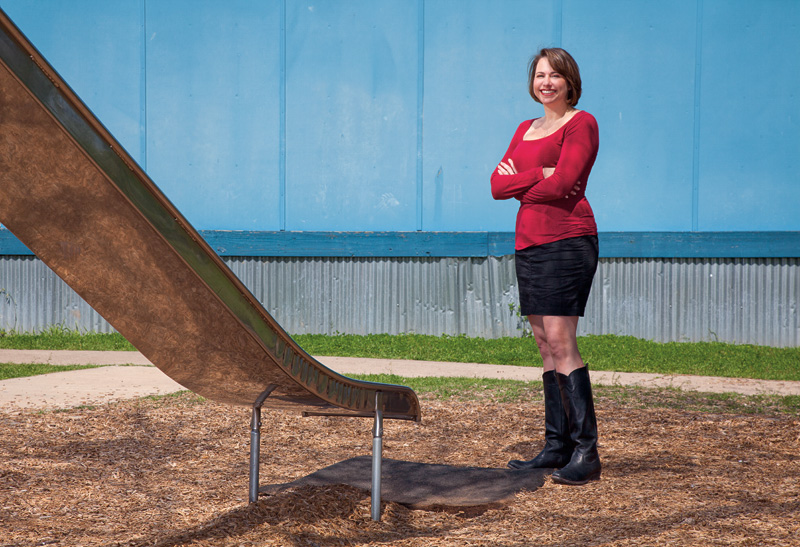Economist looks at the long-term effects of school starting age and family background
“Redshirting” is a popular term among parents of the pre-K set, and it has a lot of parents asking a familiar question: Is my child ready to start kindergarten, or would she or he benefit from delaying this debut into the world of no naps, homework, grades and real scissors?
A term borrowed from the sporting world — “redshirting” — describes how some parents opt to hold their child’s kindergarten start date back a year to allow more time for maturation and preparation for the increased pressures of kindergarten. However, research and media offer mixed reviews as parents struggle to make the decision that is best for their child.
“If this is going to be his job for the next 13-plus years, I want him to have the best start he can have,” says Courtney Knutson Graham, a McKinney mother of two, about her youngest son Oliver, age 4. “There is a lot of pressure on kids these days in school, and it starts early.”
Sandra E. Black, a professor in the Department of Economics, looks at how family background and early childhood experiences such as birth order, family size and birth weight affect long-term outcomes and if there is a way to equalize the playing field. She also studies education policy, including the effect of school starting age.
Black earned her doctorate at Harvard in 1997 and was a senior economist at the Federal Reserve Bank in New York. She was a professor at UCLA from 2001 before joining the Department of Economics at The University of Texas at Austin in 2010.
“We find little to no effect of parents’ education, family size and peer differences on the long-run outcomes of children,” says Black, a research affiliate with the Population Research Center and Center for Women’s and Gender Studies. “However, we do find an effect of birth order and family income and, to some extent, school starting age.”
School Start
Graham was able to gauge how her oldest son, Parker, age 6, performed in kindergarten. Having an October birthday, he missed the September 1 cutoff for kindergarten at his school, and as a result is one of the older students in his class.
“I feel like this was the perfect age developmentally for him to start,” Graham says.” I see the homework that Parker has to do on a daily basis and I asked myself, ‘Is Oliver ready for this?’ With Parker we have two guided reading books every night, a writing assignment and a math problem.”
“Parents may systematically choose to hold back or push forward students based on their ability, which will also be related to their longer-run outcomes,” Black says.
In her research paper, “Too Young to Leave the Nest?: The Effects of School Starting Age,” published in the Review of Economics and Statistics, Black and her co-authors examine the role of school starting age on longer-run outcomes such as IQ scores at age 18, educational attainment, employment, earnings and teenage pregnancy.
The study is the first to track men and women from ages 24 to 35 and analyze how the impacts of school starting age change with age. It’s also the first study to examine the effects of school starting age on the probability of teenage pregnancy.
It was funded by the National Science Foundation, the California Center for Population Research and the Research Council of Norway. By using large datasets of the Norwegian population — due to the country’s access to high quality long-term data — and by using advanced statistical techniques Black can identify the causal relationship, not just correlations in her research.
Her findings show little evidence that starting younger has an effect on ultimate educational attainment as some of the previous literature suggests. For men, starting a year later reduces education by one year for about one in 20 men, and the results are similar for women.
“We find that if you enter the labor market later, as a result you have less experience and so you get paid less than the people who are the same age who started earlier, but by age 30 you’ve caught up,” Black says.
The study, however, shows that boys who started school younger scored slightly higher on IQ tests when they were 18 years old. Cognitive scores around age 18 are particularly interesting since it’s the same time they will enter the labor market or college. The IQ results for boys come from Norwegian military records where military service is required for every able young man.
One intriguing research finding for the girls is that starting school early increases the likelihood of giving birth as a teen but reduces the likelihood of giving birth within 12 years of starting school. On average, 8 percent of the women gave birth as a teenager and 6 percent gave birth within 12 years of the expected school start date.
Family Order
For Joanne Zurcher, a Washington D.C. lobbyist and 2007 LBJ School of Public Affairs graduate, growing up the youngest daughter in a family of five children had its pros and cons.
“There was always a lot going on,” Zurcher says. “Whoever had the most drama and had the biggest crisis got our parents’ attention.”

Being the youngest, Zurcher says she got a lot of attention from her sister and four older brothers. And while she recalls a good childhood, she does take note of some differences between her parents’ approach with the younger siblings.
“My sister and I are 18 years apart, so when my dad was taking me to the father-daughter dance he was now the oldest man in the room instead of the youngest,” she says. “My mom was still in the mother’s club at school, but she was no longer president.
“They were not as involved in my schooling,” she adds. “You get the sense that they are thinking, ‘Oh yeah, we did that already.’”
She also describes an environment where she had to be more competitive and observant about what her older siblings were doing and what was fair.
“It’s harder to get the ‘oohs and aahs’ from your parents because your brothers and sister have already done everything,” she says.
“If my brother Michael learned to ride his bike at seven, then I was going to take off my training wheels at four. “ If my brother got to stay up 30 minutes later on h is 10th birthday, then I made sure I was going to stay up 30 extra minutes when I turned 10,” she laughs. In some ways, she says being the youngest did have its advantages.
“My parents didn’t make me crazy over stuff,” she says. “I never felt like they were on top of me every minute micro- managing me.”
Fortunately for Zurcher, her parents were able to extend all their children the same offer to help support them during college if they chose to attend.
In some cases, however, Black finds that the younger children may be getting the shorter end of the stick. And while family size doesn’t seem to matter very much, birth order does.
In her research paper, “The More the Merrier? The Effect of Family Size and Birth Order on Children’s Education,” which was published in The Quarterly Journal of Economics, she and her co-authors find there is little evidence of a causal effect of family size on children’s educational attainment. However, there is strong evidence that the birth order effect is important, suggesting that increased family size negatively affects the youngest child.
“Some people argue it’s a time investment issue,” Black says. “This is where I think the sociology and psychology literatures do a better job than economics. There are theories about why birth order matters — time with parents and time spent teaching the youngest versus being the youngest.”
The strength in Black’s economics approach in “The More the Merrier?” research is identifying the causal effect on birth order by using twin births as an “as-if-random” increase in family size to determine the effects of a larger family on existing children. It compares outcomes of first-born children whose younger sibling was a single birth versus the outcomes of first-born children whose younger siblings were a twin birth. Both parents wanted another child; some got two.
“We want to identify the effects of adding an extra child on the existing kids,” Black says. “You can’t randomly assign children, so we look at the birth of twins because that’s like a bonus baby.”
Black says you can’t really look at it so much in current data because twins are related to fertility treatments and wealthier families, but in the older dataset it wasn’t.
“Pre-fertility treatment, it was true that older mothers were more likely to have twins, but for the most part twins were pretty random events, at least from an economic perspective,” Black says.
According to her findings, later-born girls have lower earnings as adults, are less likely to work full time and are more likely to have their first birth as a teenager. In contrast, while later-born boys have lower full-time earnings as adults, they are not less likely to work full time.
The difference in educational attainment between the first child and the fifth child in a five-child family is about three quarters of a year of schooling, with evidence suggesting the effects are slightly larger for girls than for boys.
As with education, women seem to be more affected by birth order. A move from being the first child to the fourth child increases the probability of having a child as a teenager by five percentage points.
In the case of an only child, the researchers originally found a negative effect, which may seem completely counter to what one would expect.
“When we think of only children now, we often think of people who are wealthier, who waited longer to have kids and then they only have one,” Black says. “In earlier times it was more likely to be parents who got divorced and only had one child. We find that this negative only-child effect is driven by children from single-parent homes. Once you look at married parents, the only children look like firstborn children.”
Peering Ahead
Black and her co-authors are currently examining the effects of classroom peers on the longer-run outcomes of teenagers. Despite the relevance to such ongoing policy discussions as school vouchers and school choice, very little is known about the causal effect of school peers on the outcomes of children.
“The difficulty with identifying the effect of peers is that there is non-random sorting of children into schools,” Black says. “For example, wealthier families move to the same neighborhoods and their children attend the same schools.”
She’s also looking at the effect of childcare subsidies on academic performance.
“Professor Black has been a tremendous addition to the Economics Department at UT Austin,” says Jason Abrevaya, chair of the Department of Economics. “Her work in the areas of labor economics and education economics has gained her an international reputation.
“Her research is amazingly broad; in addition to her work on family composition and school outcomes, she is well known for her work on the effects of school quality on property values and the impact of workplace practices and information technology on worker productivity,” he adds. “Professor Black will be one of the leaders in our department for years to come.”
